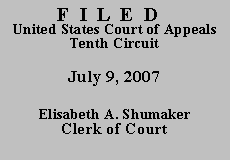

| JOSE CASTRO-QUIRINO, |
|
| v. | |
| LANE BLAIR, Warden, Torrance
County Detention Facility;
ATTORNEY GENERAL FOR THE
STATE OF NEW MEXICO,
Respondents - Appellees. |
After a New Mexico jury trial, Castro-Quirino was convicted of intimidation of a witness, aggravated battery against a household member, and criminal sexual penetration in the third degree. On direct appeal, the New Mexico Court of Appeals affirmed the convictions, rejecting Castro-Quirino's arguments of insufficient evidence. Castro-Quirino then filed a state habeas corpus petition which was denied by the state district court. His petition for a writ of certiorari was rejected by the New Mexico Supreme Court as untimely.
Castro-Quirino filed the instant § 2254 habeas application on June 25, 2003, raising the following allegations: (1) he was denied the effective assistance of trial counsel, (2) his double jeopardy rights were violated, and (3) prosecutorial misconduct and numerous errors committed by the trial court deprived him of a fair trial. Respondent moved to dismiss Castro-Quirino's § 2254 petition. The district court granted Respondent's motion, concluding Castro-Quirino's claims were procedurally defaulted due to his failure to perfect a timely petition for writ of certiorari in the New Mexico Supreme Court. See Watson v. New Mexico, 45 F.3d 385, 387 (10th Cir. 1995). The court determined Castro-Quirino failed to show cause for the default and actual prejudice or that the failure to review his claims would result in a fundamental miscarriage of justice. See Coleman v. Thompson, 501 U.S. 722, 750 (1991).
This court cannot grant Castro-Quirino a COA unless he can demonstrate "that reasonable jurists could debate whether (or, for that matter, agree that) the petition should have been resolved in a different manner or that the issues presented were adequate to deserve encouragement to proceed further." Slack v. McDaniel, 529 U.S. 473, 484 (2000) (quotations omitted). In evaluating whether Castro-Quirino has carried his burden, this court undertakes "a preliminary, though not definitive, consideration of the [legal] framework" applicable to each of his claims. Miller-El v. Cockrell, 537 U.S. 322, 338 (2003). Castro-Quirino is not required to demonstrate his appeal will succeed to be entitled to a COA. He must, however, "prove something more than the absence of frivolity or the existence of mere good faith." Id. (quotations omitted).
This court has reviewed Castro-Quirino's appellate briefs, the district court's order, and the entire record on appeal pursuant to the framework set out by the Supreme Court in Miller-El and concludes that Castro-Quirino is not entitled to a COA. The district court's resolution of Castro-Quirino's claims is not reasonably subject to debate and the claims are not adequate to deserve further proceedings. Accordingly, Castro-Quirino has not "made a substantial showing of the denial of a constitutional right" and is not entitled to a COA. 28 U.S.C. § 2253(c)(2).
This court denies Castro-Quirino's request for a COA, dismisses this appeal, and grants counsel's motion to withdraw.
ENTERED FOR THE COURT
Michael R. Murphy
Circuit Judge